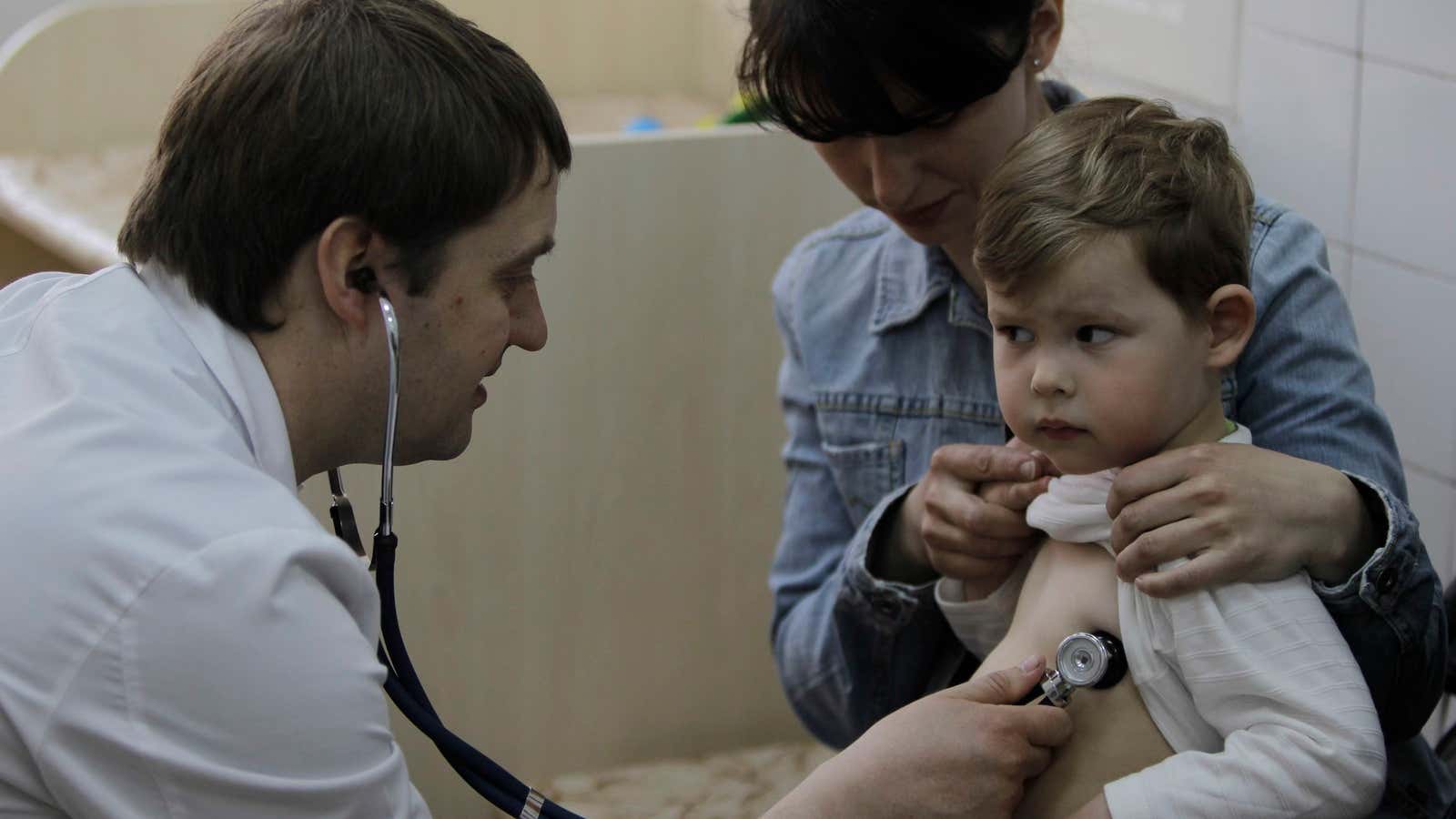When I first learned about the US measles outbreak linked to Disneyland, I was relieved. Here was proof that vaccinating my child had been the right decision.
It may sound preposterous now, but I am one of those nutty parents who thought twice about whether or not to vaccinate my now 11-month-old. I wasn’t one of the staunch anti-vaccination advocates who have been lambasted in recent weeks. But I did have a few trusted friends and relatives who were wary about vaccinations, and that gave me pause.
Ultimately, my inklings of concern got lost amid a million other parenting demands, and by the time my son’s first vaccination appointment cropped up, I succumbed to medical convention without much thought.
But here’s what I had in common with anti-vaxxers that makes me somewhat sympathetic to their predicament: When it came to vaccinations, not to mention a lot of other parenting questions, I didn’t trust my pediatrician to supply the answers.
Many parents I know who try to educate themselves about their child’s health and development aren’t comfortable delving into fundamental concerns like these with their pediatrician, especially over matters that buck medical convention. Pediatricians, in turn, are weary of the barrage of technical questions skittish parents have to ask.
Beyond misguided zealots and outspoken celebrities, what’s driving this breakdown in communication traces back to the way we are learning to parent in the US, and our doctors’ response to it. Under the pressures of minimal postpartum care, paltry maternity leave, and a deluge of online health information, the trusted counsel of family, friends, and doctors that once shaped our parenting mores has given way to an explosion of experts touting fail-safe solutions to every parenting problem imaginable. If we aren’t trolling listservs, mommy blogs, parenting websites, and research reports online, we are taking refuge in the litany of how-to parenting guides. (And if we aren’t doing that, we’re failing in our parental duty.)
In countless books and articles, diaper-changing techniques are extrapolated to all-encompassing world views: attachment parenting, Babywise parenting, authoritative parenting, permissive parenting, French parenting, Tiger Mom parenting. For every established parenting guru that lasts through a publishing cycle—Benjamin Spock, William Sears, Gina Ford, Richard Ferber—there are a dozen new authorities cropping up to vie for those coveted spots: Marc Weissbluth, Harvey Carp, Annabel Karmel, Michel Cohen, Jennifer Waldburger, Jill Spivack, Gill Rapley, Tracey Murkett.
This isn’t just a problem for over-educated elites. A recent NBER paper (pdf) by Matthias Doepke and Fabrizio Zilibotti found that intrusive parenting is more prevalent in countries with rising inequality, where parents worry more about their child’s lot later in life.
In Britain, the worries run so deep that the government tried out subsidized parenting classes in low-income areas (here’s one parent’s account of them). That was on the heels of a 2011 government report (pdf) that cited research on how children’s brains are largely shaped in the first few years of life. “In that period, neglect, the wrong type of parenting and other adverse experiences can have a profound effect on how children are emotionally ‘wired’. This will deeply influence their future responses to events, and their ability to empathize with other people,” the report said.
With warnings like these, it’s no wonder parents toil endlessly over every decision and find ways to cope. For some, that means going with our gut (whatever’s left of it) or harking back to the wisdom of family, friends, or pediatricians. For others, it means studying up as best we can so that at least we can assure ourselves that we tried to get it right.
Self-education wouldn’t be a problem—indeed, the medical establishment generally considers it a virtue—if our healthcare system offered overwhelmed parents a last line of defense. But all signs point to American doctors becoming more terse and unavailable to their patients. In the US, the standard primary care visit has been whittled down to roughly 15 minutes, as doctors have caved to tight fee schedules set by insurers.
During that fleeting window, research has found that doctors aren’t doing a good job listening. A 1999 study of 29 family physician offices in the US, for instance, found that doctors allowed patients to speak for 23 seconds on average before redirecting them. Nearly three out of four patients were interrupted before they had finished stating their concerns.
Meanwhile, patient satisfaction is on the decline, and doctors lament a golden age of medicine when they garnered more respect and had more time. As one doctor wrote in the Wall Street Journal, “I realize that in many ways I have become the kind of doctor I never thought I’d be: impatient, occasionally indifferent, at times dismissive or paternalistic.”
All this makes uninformed patients the easiest kind for doctors to manage, and overly-informed parents a nuisance. One friend told me that when she asked her daughter’s pediatrician if she could stagger her vaccinations, he responded curtly that he “had to draw the line somewhere” and if she wasn’t comfortable with the standard then she should ”find another practice.” And off she went.
Parents can hardly be blamed for bad medical decisions that doctors can’t be bothered to try to prevent or solve. And ridiculing those parents—as some seem to think is the solution—only deepens the divide between them and doctors willing to address the questions they so desperately want resolved.




